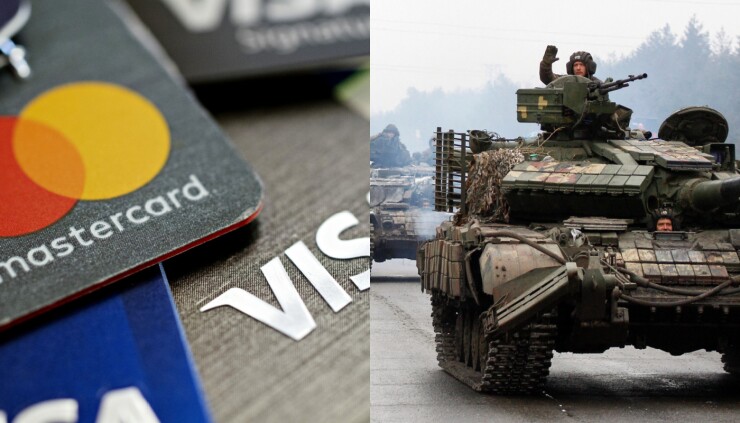Many companies are curtailing their business dealings with Russia after its invasion of Ukraine, but the measures Visa and Mastercard have taken against Russia’s largest banks are among the sternest.
"Any sanctions preventing access to the Visa and Mastercard networks for authorizations, acquiring and payment processing would cripple the Russian economy," said Richard Crone, a payments and retail consultant in San Mateo, California.
Visa and Mastercard on Monday blocked access to their networks for a large share of the Russian banking market apparently in response to U.S. government sanctions that bar American companies from doing business with key Russian banks. Since card networks provide a variety of services to consumers, banks and merchants, an action as simple as ordering online or a point-of-sale transaction in Russia could become difficult, if not impossible.
"With Mastercard and Visa turning off the network and the popular mobile wallets also being turned off, merchants and consumers will find it very hard to make purchases unless they have cash," said Tim Sloane, vice president of payments innovation at Mercator Advisory Group in Concord, Massachusetts, noting the existing run on ATMs and cash shortages in Russia could get worse. "E-commerce will now be extremely difficult, if not impossible, for many Russians."

In a statement posted on Mastercard's website, the card brand said it has blocked multiple financial institutions from the Mastercard payment network. "We will continue to work with regulators in the days ahead to abide fully by our compliance obligations as they evolve." Visa's statement said it was taking "prompt action" to ensure compliance with applicable sanctions, and it is prepared to comply with added sanctions that may be implemented.
Mastercard also announced a $2 million contribution to the Red Cross, Save the Children and its employee assistance fund for humanitarian relief. Visa will provide a $2 million grant to the U.S. Fund for UNICEF to support aid to the people of Ukraine. Visa will also match employee donations up to $1 million to the Ukrainian response funds of UNICEF and the Red Cross.
Visa and Mastercard did not return requests for comment by deadline.
Mastercard and Visa did not identify specific banks in their statements. The U.S. Treasury Department has sanctioned Sberbank and VTB Public Bank, along with Russia's military bank, PSB. Sberbank has more than two dozen subsidiaries, while VTB has 20 subsidiaries. The three banks make up more than half of the total banking system in Russia, and the Biden administration has added two dozen other financial institutions, railroads and other companies that access domestic and international card payments.
There are about 300 million credit and debit cards in Russia, a country with a population of about 141 million, according to Statista, which also reports Visa and Mastercard control about 72% of the country's card market. Even without a ban on all Russian banks and the availability of a local card option, the impact of Visa and Mastercard's moves could be severe.
"About 30% to 60% of the retail payments mix for most mainline retail merchants in Russia depend on Visa and Mastercard for authorization — they can’t go anywhere else to get that card authorized for payment settlement," Crone said, adding that the card networks are also the backbone for cross-border interoperability for ATM transactions through Mastercard's Maestro and Visa Plus networks. "So even in a cash-heavy economy, limiting ATM access would be devastating," Crone said.
Among other payment companies, Apple Pay and Google Pay accounts tied to sanctioned Russian banks have reportedly been deactivated. Apple and Alphabet did not return requests for comment. And American Express in 2021 struck a deal with Sberbank to expand card acceptance in Russia. American Express did not return a request for comment on the status of its Sberbank partnership.
"Presumably most Russian cardholders and merchants won’t be able to use Mastercard and Visa," said Eric Grover, a principal at Intrepid Ventures in Minden, Nevada.
The U.S. and European Union have also cut select Russian banks from Swift, a Brussels-based global network that supports messaging for international transactions. And the U.S. has sanctioned Russia's central bank, banning Americans from doing business with the Russian central bank and freezing its assets in the U.S.
This combination of sanctions will isolate Russia even further from conducting business with the West and making money movement more difficult, said Sarah Grotta, director of the debit advisory service at Mercator Advisory Group in Lakewood, Ohio. "It will be particularly challenging for Russians to make purchases across borders," Grotta said.
Russia's potential responses, beyond sanctioning U.S. businesses directly, would be to push its local Mir card network. Mir debuted in 2015 and has grown to about 24% of Russia's card market. The advance of the Mir network would massively accelerate given Visa and Mastercard's ban in Russia, Grover said.
While Visa and Mastercard will lose business by cutting off Russian banks, both card brands have diversified their businesses, adding nonpayment services and new markets that could soften the blow.
"The Russia ban will impact Visa and Mastercard, but they have diversified portfolios," Crone said.





